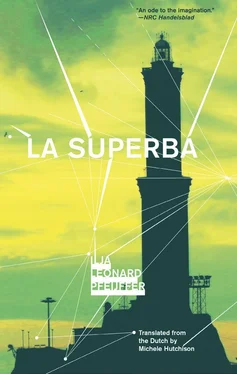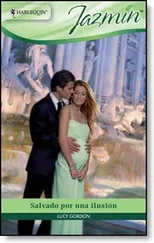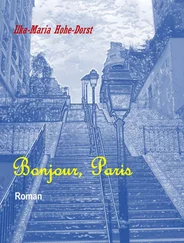There are some rifts in Genoa that can never be bridged. In the labyrinth alone, there’s an invisible, electrically charged curtain at the level of Via Luccoli separating the Molo quarter from the Maddalena quarter. Tourists aren’t aware of it and I wasn’t, either, at first, but the force field gains intensity the longer I’m here. It exists in that special gaze of the signora as I tell her that I had coffee on the other side, in Via del Campo or on Piazza Lavagna. I know every rose seller and every busker in Molo — they don’t venture into Maddalena, just as its beggars don’t dare venture into Molo. The girls there are different, the dogs bigger. Thugs and whores and the old, flaking transvestites from the Vico della Croce Binaci, the middle-aged men with beer bellies and fishnets with two packets of cotton wool in their bras — they all live in Maddalena.
In the same way, there are two football clubs: Genoa and Sampdoria. One is the best club, the other always wins. As the oldest football club in Italy, one of them fosters tradition, the other has the money. They share a stadium in Marassi and when one is playing home, the other plays away. Their supporters never meet, except at the derby. And everyone in Genoa supports one of the two teams, including the women and children. They don’t have to wear the club’s colors. You can tell from a person’s nose whether they are familiar with the depths of suffering or whether they’ve plumped for success.
Nor will you ever be able to close the gap between the inhabitants of the labyrinth and the hundreds of thousands of others happy enough to call themselves Genoese — those who occasionally travel in cars or on Vespas to the historic center from their luxurious lives in outlying apartments with sea views ten or twelve kilometers away in Quinto or Nervi so they can poke around in cute little shops like Laura Sciunnach’s or Chris & Paule and carry on like it’s their city — while just twenty meters beyond their shops they’d be hopelessly lost. The store managers come from outside, too. They arrive every morning with a scooter helmet dangling from their wrists and every night, carrying the same helmet, they go back to their sad, ordered lives in the flats of San Fruttuoso, Marassi, or Castelletto without knowing about the rats, the whores, the old transvestites with their beer bellies, and the foul-mouthed fishmongers around the corner.
Bibi and the beautiful, sad lady traveled in like this in the morning, arriving around nine thirty. Bibi was usually the first. He’d raise the security shutters. He’d put two of the three flowerpots on the pavement outside and then rummage around in his shop. The third flowerpot is kept inside the clothes shop at night and is put out by the beautiful, sad lady. She waters all three of the plants, cuts off the dead leaves, and carefully puts the three pots in the window box. Then she goes back inside.
At that moment, Bibi comes outside to hang up the tin bucket on the nail in the wall between the two door openings. The bucket functions as a communal ashtray. He inaugurates it by leaning indifferently, not to say expressionlessly, against the doorpost smoking a cigarette. When he’s done, the beautiful, sad lady smokes a cigarette in her door opening. Usually she wears boots, although I don’t know why it’s of interest to tell you that. She throws her stub in the bucket.
As I said, there aren’t many customers. The entire day — until long after the candles have been put out on the tables in the Bar of Mirrors and the Prosecco twinkles between conversations in the trapeze of art, poetry, and politics — they will smoke lots and lots of cigarettes in their respective door openings — Bibi on the right at 74 rosso, her on the left at 72 and 70 rosso. They’ll carefully aim all of their stubs into the bucket. The yellow flowers in the three flowerpots will look lovely. They won’t talk to each other, not because they don’t like each other, on the contrary, but because there isn’t much to say without candlelit Prosecco. Various girls will call on Bibi; they won’t want to buy bracelets or rings, but each of them believes she is special to him. He will look down on them with scorn. He will hardly speak to them, either. They’ll slink off and you can count on them returning in boots with even higher heels.
Very rarely, they’ll almost touch, but they don’t realize it — I’m the only person who can see it. From the terrace. Sometimes Bibi will reach for a catalogue on the right of his counter at precisely the same moment she is rearranging the skirt suits on the racks to the left of the register. There’s nothing more than an old medieval wall, twenty centimeters thick, between their two hands.
They close at seven thirty. The yellow flowers go back inside, two pots in his shop, one in hers. The last thing Bibi does is to get down the tin bucket from the hook. She rolls down the shutters and padlocks them to the marble shop front. She closes the cast iron fence and secures it with a chain lock. Then they exchange a few words. He says “Ciao.” She asks whether he might like to drink a Prosecco on the terrace. He says he’s tired. Then they both return to their own flats with a scooter helmet dangling from their wrists — his with a Sampdoria sticker, hers sprayed in the tragic red and blue of Genoa.
31.
I could barely repress the urge to tell all my new Genoese friends about my fairy-tale evening. But it turned out to be entirely unnecessary. Everyone knew about it already. I flattered myself with the thought that she’d gone around telling everyone but realized at the same time I shouldn’t entertain any illusions, because everyone always knows everything already in Centro Storico. “Entertain no illusions,” she said. “You know I had my bathroom redone recently? The work was done by two carabinieri wanting to earn a bit of cash on the side. The day before yesterday I met them in a bar around the corner from my house to pay them. ‘You’ve been hanging out with that foreign poet a lot recently,’ one of them said. And I don’t even live anywhere around here.”
“Why are you looking at me like that?”
“Like what?”
“Like that.”
She was silent.
“Aren’t you happy I completed your quest and found the Mandragola?”
She still didn’t say anything and didn’t look very happy, either.
“Are you jealous?”
I shouldn’t have said that.
“Who do you think you are?” she said. “Who do you think you are? You parachute yourself and your colossal body into our streets and then you think you understand everything. You’re still messing up the subjunctive and you don’t understand anything, Ilja. Ilja Leonard. Leonardo. You don’t even deserve that honorable title you invented for yourself. You still have to earn it. Go and write it all down in your little notebook. All those things you think you’ve understood. Have you already explained why the English flag is identical to the Genoese flag? That because for a long time our fleet was the mightiest and that we rented out our flag to the English for a lot of money so that no one would dare attack their ships anymore? It’s a famous story, you know. Your readers in the Far North are really fascinated by that kind of thing, I’m sure of it. And no, I’m not going to dictate it to you. Go and google it yourself, Leonardo. You’re the writer. And have you already written down that the city’s old nickname is La Superba? I guess so. And I’m sure you’ve given it a literary twist? Since you understand everything, don’t you, Leonardo? Let me guess. It means superb and reckless, beautiful and proud, alluring and unapproachable; you must have learned Latin and I don’t doubt you’ve given it a deep, etymologically justified slant. And what have you called me in your notebook? Cinzia? My real name? If that so-called novel of yours is ever published, I’ll set my family’s lawyers on you. They’ll tear you to shreds. You won’t stand a chance. You don’t understand anything, Ilja. And what have you called her? Or don’t you dare? Do you know where she comes from? Do you know her family? Do you know which of her brothers, lovers, or lawyers will come banging on your door tonight, if they haven’t already soldiered their way into your miserable apartment? Everyone knows you. Everyone knows where you live, Ilja. I’m trying to make that clear to you. You think this is Europe because you can get here on EasyJet within an hour and a half from your efficient fatherland. You’re mistaken. You’re in Genoa. This is Africa. This world is totally foreign to you.
Читать дальше












